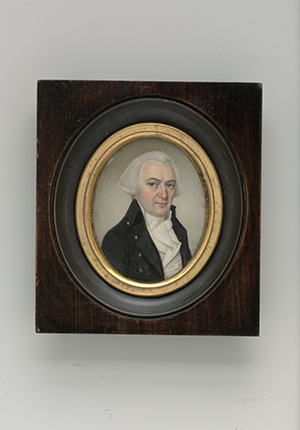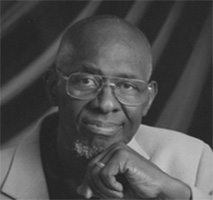Historic Document
Morris, Constitutional Convention Speeches (1787)
Gouverneur Morris | 1787

The Metropolitan Museum of Art, New York, Dale T. Johnson Fund, 2006
Summary
Gouverneur Morris remains in many ways the least understood and most important of the delegates at the Convention. He was no grandstander, despite a reputation for daring brashness. Nor did he produce the most elaborate theoretical statements of constitutional principles within the debates. However, he was certainly one of the most persistent and visible participants. He was the only one who, on more than one occasion, expressly announced his opinions (and thus, votes) changed by the debates. He was important not so much for his draftsmanship of the final document (which could have given him Jefferson-like claim to tombstone recognition) but, rather, for his determined participation in driving a narrative of transaction as the foundation of the entire undertaking. He displayed keen recognition that the idea of political union was equivalent to concocting an unstable, always potentially explosive, solution in a chemistry laboratory.
Through Morris, we learn that the often-celebrated exclusion of the term “slave” from the document was not a simple accomplishment. For Morris had specifically moved to include the term “slave” in reference to the slave trade, paired with a reference to the states of North Carolina, South Carolina, and Georgia, which insisted upon the trade for their participation in the union. Morris withdrew his motion upon objection. The objection, however, arose from the perceived aspersion on the slaveholding states. But, in the course of the Convention, no one spoke more decidedly against the practice of slavery than Morris had done. Accordingly, his “dealing” with the slave interest on this occasion is evidence of the overall approach he took to the constitutional deliberation. It was all give-and-take.
Selected by

William B. Allen
Emeritus Dean of James Madison College and Emeritus Professor of Political Science at Michigan State University

Jonathan Gienapp
Associate Professor of History at Stanford University
Document Excerpt
July 5, Morris declaimed: “An accurate view of the matter would nevertheless prove that property was the main object of Society. The savage State was more favorable to liberty than the Civilized; and sufficiently so to life. It was preferred by all men who had not acquired a taste for property; it was only renounced for the sake of property which could only be secured by the restraints of regular Government. These ideas might appear to some new, but they were nevertheless just. If property then was the main object of Govt. certainly it ought to be one measure of the influence due to those who were to be affected by the Governmt.”
Mr. Rutlidge of South Carolina: “I agree with Mr. Morris. Property is the object of Society.”
Mr. G. Morris: “regretted the turn of the debate. The States he found had many Representatives on the floor. Few he fears were to be deemed the Representatives of America. He thought the Southern States have by the report more than their share of representation. Property ought to have its weight; but not all the weight. He came here as a Representative of America; he flattered himself he came here in some degree as a Representative of the whole human race; for the whole human race will be affected by the proceedings of this Convention. He wished gentlemen to extend their views beyond the present moment of time; beyond the narrow limits of place from which they derive their political origin. If he were to believe some things which he had heard, he should suppose that we were assembled to truck and bargain for our particular States. He can—not descend to think that any gentlemen are really actuated by these views. We must look forward to the effects of what we do. These alone ought to guide us. Much has been said of the sentiments of the people. They were unknown. They could not be known. All that we can infer is that if the plan we recommend be reasonable & right; all who have reasonable minds and sound intentions will embrace it.”
July 11, Mr. Morris was “reduced to the dilemma of doing injustice to the Southern States or to human nature, and he must therefore do it to the former. For he could never agree to give such encouragement to the slave trade as would be given by allowing them a representation for their negroes, and he did not believe those States would ever confederate on terms that would deprive them of that trade.”
August 8, Mr. Morris: “He never would concur in upholding domestic slavery. It was a nefarious institution- It was the curse of heaven on the States where it prevailed. Compare the free regions of the Middle States, where a rich & noble cultivation marks the prosperity & happiness of the people, with the misery & poverty which overspread the barren wastes of Va. Maryd. & the other States having slaves. (Travel thro’ ye whole Continent & you behold the prospect continually varying with the appearance & disappearance of slavery. The moment you leave ye E. Sts. & enter N. York, the effects of the institution become visible; Passing thro’ the Jerseys and entering PA every criterion of superior improvement witnesses the change. Proceed Southwdly, & every step you take thro’ ye great regions of slaves, presents a desert increasing with the increasing proportion of these wretched beings.) Upon what principle is it that the slaves shall be computed in the representation? Are they men? Then make them Citizens & let them vote. Are they property? Why then is no other property included? The Houses in this City (Philada.) are worth more than all the wretched slaves which cover the rice swamps of South Carolina. The admission of slaves into the Representation when fairly explained comes to this: that the inhabitant of Georgia and S. C. who goes to the Coast of Africa, and in defiance of the most sacred laws of humanity tears away his fellow creatures from their dearest connections & dam(n)s them to the most cruel bondages, shall have more votes in a Govt. instituted for protection of the rights of mankind, than the Citizen of Pa or N. Jersey who views with a laudable horror, so nefarious a practice.
…
The consequence of such a transfer of power from the maritime to the interior & landed interest will he foresees be such an oppression of commerce, that he shall be obliged to vote for ye. vicious principle of equality in the 2d. branch in order to provide some defence for the N. States agst. it. But to come now more to the point, either this distinction is fictitious or real: if fictitious let it be dismissed & let us proceed with due confidence. If it be real, instead of attempting to blend incompatible things, let us at once take a friendly leave of each other. There can be no end of demands for security if every particular interest is to be entitled to it. The Eastern States may claim it for their fishery, and for other objects, as the Southn. States claim it for their peculiar objects. In this struggle between the two ends of the Union, what part ought the Middle States in point of policy to take: to join their Eastern brethren according to his ideas. If the Southn. States get the power into their hands, and be joined as they will be with the interior Country they will inevitably bring on a war with Spain for the Mississippi. This language is already held. The interior Country having no property nor interest exposed on the sea, will be little affected by such a war. He wished to know what security the Northn. & middle States will have agst. this danger.”




